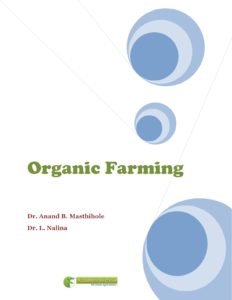Book Detail: Organic Farming 
Language: English
Pages: 94
Author: Dr. Anand B. Masthihole, Dr. L. Nalina
Price: Free
Other Horticulture books Free Download
Outlines of Organic Farming
Lecture 1 -General Status and trends in population and food production, Agriculture growth, Fertilizer and Pesticide consumption and negative impacts of their excess application
Lecture 2 -Relevance of organic farming (OF), Consequences of the use of High Yielding Varieties (HYV) and Indigenous Varieties. Impact of Green Revolution (GR) on Environment. Effects of Green Revolution.
Lecture 3 & 4 -Concept of OF, Significance of OF for Indian farmers, Terminologies used in OF, Objectives of OF, Characteristics of OF, Often debated issues in OF, Area under OF and size of organic food market. Status of OF in India.
Lecture 5 -Organic production requirements, Components of OF, Nutrient requirements in OF, Limiting nutrient losses, Organic manures: Farm Yard Manure (FYM), Enrichment of FYM.
Lecture 6 -Compost, Methods of composting (Bangalore, Indore, Coimbatore, NADEP methods).
Lecture 7 -Green manuring, Classification of green manures (GM), advantages of GM, Desirable characteristics of leguminous GM crops.
Lecture 8 -Vermicompost and vermiculture, Importance, benefits, Methods of vermicomposting, Preparation and management of vermicompost unit.
Buy Instant Horticulture
Lecture 9 -Recycling of organic residues, Classification of organic residues.
Lecture 10 -Biofertilizers, Importance, classification and benefits of biofertilizers (Azospirillum, Azotobacter, Rhizibium, PSB, VAM etc.,)
Lecture 11 -Soil improvements and soil amendments, Salinity, Alkalinity, Acidity, Types of amendments
Lecture 12 -Weed management in organic farming, Different methods of weed management, Biological weed control, Use of bioherbicides (mycoherbicides) and Bioagents.
Lecture 13 -Organic food quality, Quality attributes, Chemical food contaminants, Microbial food contaminants, Aims of organic production and processing.
Lecture 14 & 15 -Quality control standards, Important organic standards (IFOAM basic standards, Codex alimentarius guidelines, EU regulations, NSOP), Common issues in the various standards.
Lecture 16 -Certification, Types of certification, Certification process and procedure, Group certification, Internal control system (ICS).
Lecture 17 -Certification agencies, Accreditation processes and accreditation agencies, Important organic food products, Organic markets.
Feedback: After Reading these ICAR eCourse, please give your feedback for improve of the e-Course contents on this website. Click Here
Disclaimer:The information on this website does not warrant or assume any legal liability or responsibility for the accuracy, completeness or usefulness of the courseware contents.
The contents are provided free for noncommercial purpose such as teaching, training, research, extension and self learning.
If you are facing any Problem than fill form Contact Us
If you want share any article related Agriculture with us than send at info@agrimoon.com with your contact detail.




Organics farming karna chahta hu.
Is it Available in marathi
No dear